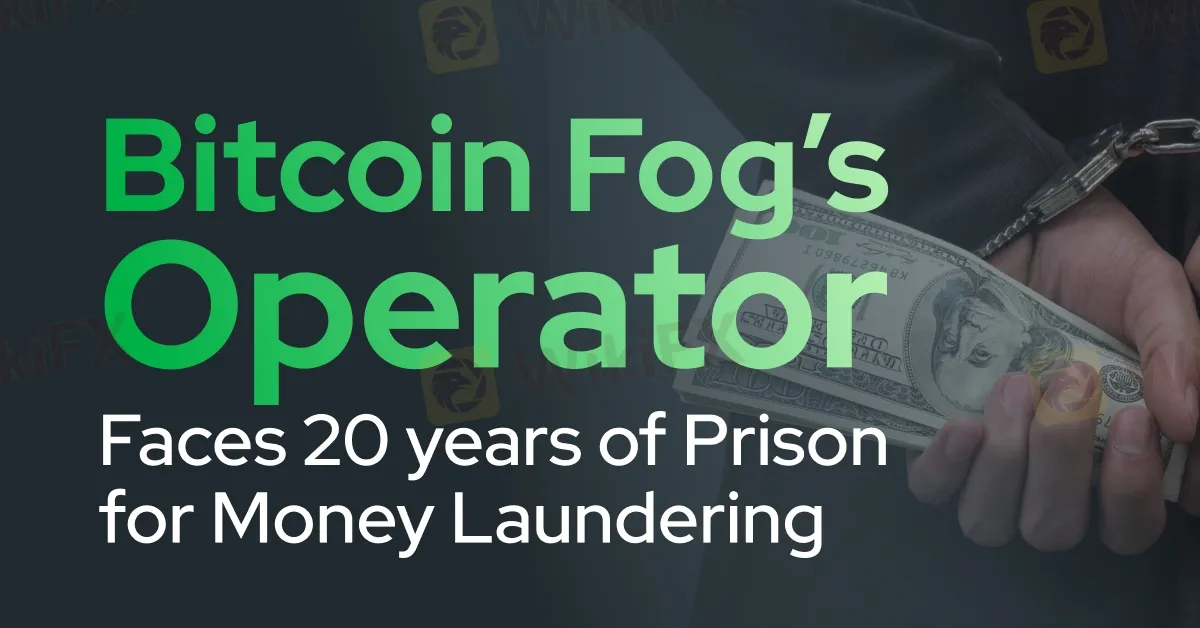简体中文
繁體中文
English
Pусский
日本語
ภาษาไทย
Tiếng Việt
Bahasa Indonesia
Español
हिन्दी
Filippiiniläinen
Français
Deutsch
Português
Türkçe
한국어
العربية
Bitcoin Fog’s Operator Faces 20 years of Prison for Money Laundering
Abstract:Roman Sterlingov, the operator behind the cryptocurrency mixer Bitcoin Fog, has been found guilty of facilitating the laundering of hundreds of millions of dollars, primarily sourced from illicit drug sales on darknet markets.

Roman Sterlingov, the operator behind the cryptocurrency mixer Bitcoin Fog, has been found guilty of facilitating the laundering of significant sums, primarily sourced from illicit drug sales on darknet markets. A federal court jury in Washington convicted Sterlingov on all four counts after two days of deliberation.
Initially indicted in 2021 on charges of money laundering and running an unlawful money transmission service, court documents revealed that Bitcoin Fog processed hundreds of millions of dollars, with $78 million traced back to known darknet markets. Sterlingov, aged 35, now faces a potential maximum prison sentence of up to 20 years.

Testimony during the trial included statements from individuals involved in cryptocurrency-related crimes, such as Ilya Lichtenstein and Larry Harmon, both of whom have admitted guilt to money laundering charges linked to their own crypto activities.
According to prosecutors, Sterlingov ran Bitcoin Fog from October 2011 to April 2021. The service, known as a cryptocurrency “mixer” or “tumbler,” gained notoriety for aiding criminals in laundering funds and concealing illicit proceeds. Over its ten-year existence, Bitcoin Fog processed over 1.2 million bitcoins (BTC), valued at approximately $400 million at the time. The majority of these funds originated from illegal sources, including darknet markets involved in drug sales, computer crimes, and identity theft. Additionally, the service was utilized by individuals distributing child sexual abuse material (CSAM), notably through the site Welcome to Video.
The Department of Justice (DoJ) noted that Sterlingov initially marketed Bitcoin Fog as a tool for anonymizing bitcoin transactions and circumventing law enforcement. The service charged customers a fee for its use. Notably, major users of Bitcoin Fog included darknet markets such as Agora, Silk Road, Silk Road 2.0, Evolution, and AlphaBay. The jury concluded that Sterlingov's activities constituted an illegal money transmitting and money laundering service under federal law.
Throughout the trial, Sterlingov maintained his innocence, claiming he could not recall creating the Bitcoin Fog domain and questioned his involvement in its operation. However, the jury dismissed his defense and the argument presented by his lawyer, citing the lack of direct evidence linking Sterlingov to the operation of Bitcoin Fog.
This case underscores the heightened scrutiny that cryptocurrency mixers have faced from U.S. lawmakers and government agencies in recent years. Mixers have been criticized for complicating the tracing of financial flows due to their ability to obfuscate the origins of cryptocurrencies.
Furthermore, the court ordered the government to seize various assets, including more than 1,354 Bitcoin stored in a Bitcoin Fog wallet, along with $349,625 and other cryptocurrencies (Bitcoin, Ethereum, Monero, Stellar) from Kraken cryptocurrency exchange accounts. Sterlingov's sentencing is scheduled for July 15th.

Disclaimer:
The views in this article only represent the author's personal views, and do not constitute investment advice on this platform. This platform does not guarantee the accuracy, completeness and timeliness of the information in the article, and will not be liable for any loss caused by the use of or reliance on the information in the article.
Read more

Malaysia’s Crypto Landscape: Adapting Amidst Global Ambitions
The United States is intensifying its efforts to become a global cryptocurrency hub under President-elect Donald Trump. Experts believe this move could prompt countries, including Malaysia, to reassess their regulatory approaches toward digital assets.

SEC Approves Hashdex and Franklin Crypto ETFs on Nasdaq
The SEC has approved crypto index ETFs by Hashdex and Franklin Templeton, including Bitcoin and Ethereum, marking a milestone in crypto asset investment.

North Korean Hackers Steal $1.3bn in Cryptocurrency in 2024
Over $2.2bn in cryptocurrency stolen in 2024, with North Korean hackers accounting for $1.3bn. Discover how cyber theft impacts the evolving crypto landscape.

ASIC Sues Binance Australia Derivatives for Misclassifying Retail Clients
ASIC accuses Binance Australia of misclassifying 500+ retail clients as wholesale, denying key consumer protections for crypto derivatives. Penalties and reforms are underway.
WikiFX Broker
Latest News
ASIC Sues Binance Australia Derivatives for Misclassifying Retail Clients
WikiFX Review: Is FxPro Reliable?
Malaysian-Thai Fraud Syndicate Dismantled, Millions in Losses Reported
Trading frauds topped the list of scams in India- Report Reveals
AIMS Broker Review
The Hidden Checklist: Five Unconventional Steps to Vet Your Broker
YAMARKETS' Jingle Bells Christmas Offer!
WikiFX Review: Something You Need to Know About Markets4you
Revolut Leads UK Neobanks in the Digital Banking Revolution
Fusion Markets: Safe Choice or Scam to Avoid?
Currency Calculator


